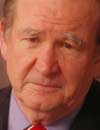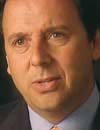- Ken Auletta
Writer, The New Yorker - Patrick Buchanan
Commentator; former adviser to President Nixon - Walter Cronkite
Former anchor, CBS Evening News - John Hinderaker
Blogger, Power Line - Bill Keller
Editor, The New York Times - Markos Moulitsas
Blogger, Daily Kos - Jay Rosen
Blogger; Professor, New York University - Ron Suskind
Author, The One Percent Doctrine
[It] seems safe to say there are more conservative voices in media. The landscape has changed.
Oh, I think there is no question there are more conservative voices in the media. You just start with Fox News. Start with bloggers. Those are all things that didn't exist 10 years ago. You've got a lot more voices, and that's a very healthy thing.
But the important thing is transparency here. That is to say, if someone on Fox News -- if their slogan is "Fair and Balanced," is that a true slogan? Does that represent the truth? It doesn't. Sometimes it does, but oftentimes it doesn't. ... And when someone claims they have no interest, and they have an agenda -- be it a liberal or a left agenda or a right agenda -- it should be exposed.
But the good news is that you've got so many different sources of information out there -- cable news, the Internet, newspapers, magazines, television, satellite television, your iPod -- that people in a democracy can choose. That's a good thing. And if they want to choose a conservative blogger or a Fox News or a CNN, good for them.
[Is it always a good thing?]
It is more ways to get around the filter. That's a healthy thing. It's also an unhealthy thing in the following sense: You have so many sources of information that you don't have any common sources of information. It used to be that our common sources of information were the networks, let's say. So on a typical evening at 6:30 at night, 90 percent of Americans were watching one of three network newscasts, which were fairly similar. ... And in a world that is increasingly polarized between left and right, people have an excuse now to say: "Hey, I don't trust your news. I want my news. I want Fox News. I want The Nation news. I want whatever news that shares my views." Therefore that common source of news declines in value, and that's a problem in a democracy, which is based on compromise. ...
Let me go back to the bias issue. When you think about those days and you think of today, can you compare it?
I can. Here's what's happening: Since the Agnew speeches, there has been a tremendous -- I don't deny it -- a corrective. The first thing that happened was the arrival of young conservative columnists on the op-ed pages of various newspapers to the point where they almost dominated the op-ed pages.
Then came the arrival of talk radio in the '80s. You had the arrival of nationalized talk radio with Rush [Limbaugh], and you've got the Internet, and you've got Fox News. So, if you will, there is an alternative media today. It's a populist media. Populist media today is conservative. ...
So from your point of view, things are much better?
There's no question about it. I can see talk radio is a tremendously powerful influence, and it's overwhelmingly dominated by conservatives. ... These are reforms.
These are reforms?
Uh-huh. Excellent reforms, partly as a consequence, I think, of the criticisms of the media. Some of the media made the reforms themselves about the op-ed pages and partly as a result of a marketplace. The American people want to hear conservative voices, and with this multiplicity of cable channels and news stations -- all-news talk … and syndicated and networked radio -- people pick and choose what they want to hear.
They want to hear Rush, and they want to hear [Fox News' Sean] Hannity, and they want to hear the conservative voices, and the liberals have a very hard time. You've got to go to taxpayer-subsidized PBS pretty much to hear a lot of them.
So you think PBS is biased?
If the institution is tax-exempt or tax-subsidized, you'll find liberals are much stronger in it than conservatives. If it's [a] monopoly, if it's more free market-oriented and there are tremendous multiplicity channels, you'll find conservatives do just fine.
And how do you explain that?
I think the people are conservative. ... There are people who are interested in news, ideas, information -- they're conservative. And when you give them a place to go, they will go to it. If you build it, they will come.
What do you think when you watch something like Fox News?
Well, now there's a whole 'nother story. There is a conservative organization -- conservative management, conservative ownership -- and they are hiring commentators who are right-wing, and you're getting that version from their broadcast. And that's fine. If they want to do that, they should do it.
Our broadcast organizations ... keep us hired when they find that we're liberal, I suppose, and if we limit our liberal stance to commentary, that's perfectly all right. We are not permitted to let our news broadcasts be affected by such prejudice. ... If I ventured -- only occasionally did I do this -- but [if] I ventured from the news we're covering ... into a commentary, a straight, out-and-out commentary, labeled as such, then I'm permitted to do my piece as a liberal. If I'm doing a straight report, I'm not entitled to do that. ...
How would you compare the prevalence of conservative voices in the media today to 15 years ago?
It's easier for conservatives to be heard now than it was 10 or 15 years ago primarily because of the new media. Virtually every newspaper in the United States -- I could count two or three exceptions, but only that many, certainly, among the major daily newspapers -- [are] all run by liberals. The news magazines are all liberal in orientation. The television networks are all liberal. And so I think that on talk radio, initially, and then followed up on the Internet, there's a lot more balance. ...
Do you feel that Fox News changed the landscape significantly?
... I think Fox is very middle of the road. I think they have some excellent conservative commentators. I think their actual news reporting is quite liberal. It's probably left of center if you put it on a spectrum of the American people.
So I think the stereotype of Fox as a right-wing news organization is incorrect. But certainly it is more open to conservative voices than CNN, for example, which is, again, pretty overwhelmingly liberal. Or if you compare it to the network news organizations, that would be true, too.
But do you think that conservatives have broken through in terms of being heard thanks to new media?
... It's easy to overstate the extent to which the new media have brought conservative voices a parity in the news media generally. I don't think it's happened. In some ways, liberal control over the media is stronger today than it's ever been. And I think there's an adversarial media culture in which we participate. But it's awfully easy to overestimate, I think, the impact that we have, and to underestimate the importance of the continuing control of the mainstream media by the left. ...
But you are sensitive to the bloggers, you said. You are sensitive, I assume, to Fox [News] television, to the kind of conservative talk radio that's out there pounding away?
I'm a typical thin-skinned human journalist. I don't like hearing us bashed in the conservative media, but I've gotten used to that. There's a difference, though: When Bill O'Reilly or Ann Coulter take off after The New York Times, I think most people understand that that's showmanship, that's Ann Coulter's shtick. Maybe she really believes, as she said, that Timothy McVeigh should have blown up his truck in front of The New York Times building instead of the [Murrah] Federal Building in Oklahoma, but I don't think so. I think that's for effect, and it sells books, and people understand that.
What happens when they say that you should go to the gas chamber?
That particular one came from a right-wing talk show host in San Francisco, and people understand when it's showmanship. When it comes from the vice president of the United States, when it comes from members of Congress, it stirs up a different kind of feeling. You can see it in the caliber of the mail and the phone calls that we've received. People tend to take that, I think, as license to trod out their deepest hatreds. ...
I don't mean to be too cynical about the motivations of the president and the attorney general, but some of it clearly is political. It's not an accident that a certain number of these speeches decrying The New York Times happen to be at the microphones of Republican fundraising events. The New York Times is red meat to a certain slice of the conservative base. ...
In January 2004, The New York Times created a new beat for covering the conservative movement. Why?
The conservatives clearly were the dominant force in Washington. They controlled the White House and both houses of Congress. There was a new vitality and self-confidence among conservative lobby groups. We didn't really get them that well. It seemed to be worthwhile to assign a reporter to look at conservative interest groups, the theories and the ideologies motivating those groups, their tactics and techniques and their relationships with the White House and Congress. It produced a lot of excellent reporting.
You didn't get them that well? ... Because you're a liberal, Eastern elite?
No, although I think the caricature of the Times as a liberal, Eastern elite probably meant that they were less forthcoming in talking to us. ... I do think it's generally been true that mainstream news organizations have done less well covering ... conservatives than they have covering liberals. That is to say, they're more likely to be written about in a kind of two-dimensional way. ...
[What is the] GOP "noise machine"?
The noise machine is their ability to deliver their message to almost every segment of their base on any given moment. If they want to reach their soccer moms, they have a Bill O'Reilly and they have Fox News channel. They want to reach blue-collar workers at their job sites, they have Rush Limbaugh on AM radio. Religious voters you reach through 700 Club and Pat Robertson. And down the road, it's just complete domination of the media landscape and the ability to communicate to almost everybody.
Rush Limbaugh by himself reaches 20 million people every week; sixty million people voted for George Bush. So you have a third of the base is being communicated [to] by that one individual, and then you add everybody else together, and you have a pretty dominant machine able to deliver that message. ...
Progressives don't have that. Now, of course, conservatives will talk about the so-called liberal media, but the conservative machine is actually a partisan conservative media working in concert with the Republican Party to deliver their message. There is nothing like that. You don't have execs at CBS meeting with the Democratic National Committee talking about what they're going to promote that day. Doesn't exist. Does not exist.
It does, actually: blogs. And we're so tiny. You people who want to give us all sorts of credit and assign to us all sorts of power, we're tiny. I reach on a daily basis between half a million and a million people a day, and that sounds really impressive until you compare that to Rush Limbaugh and his 20 million a day. And that's just Rush. You throw in Sean Hannity [of Fox News], he's about at 6 million, and go down the list. They have a lot of people reaching a lot of people, and we have blogs. It's actually kind of pathetic.
So little by little, there's effort to build that infrastructure. You have Air America on -- liberal talk radio -- and independent liberal talk radio that's sprouting up [in] a lot of places, but they're nowhere near what the conservatives have. ...
[How important is Fox News in terms of the changes that have happened in the media landscape?]
Having a news network organized on different principles is important because it breaks the monopoly. It shows that there are other ways of doing things. It says there's an alternative. It generates a new audience. Fox demonstrated that there was a market for another formula in news, and that's significant.
[Do] you like it, partisan journalism and Fox News?
I don't like Fox News, but not because it's partisan-inflected. I don't like it because it's unreliable. It's very sensationalized. It's low-cost news that puts entertainment ahead of actual news gathering. So I don't like it for those reasons. I think a conservative network that had high professional standards and was also well financed and had a large, active newsroom would be interesting. I don't think that would be necessarily a terrible thing. ...
Is the Lott case an example of partisan journalism doing good?
Well, first of all, journalists are the ones who think that opinion disqualifies someone from giving good information. In reality, lots of people connect to the public world and the political world through opinion and argument and controversy and belief and conviction. Certainly rooting [for] our side against them, that's normal. It's not abnormal. There's not something defective about it. That's the way most people participate in politics.
It turns out that getting people engaged through argument is a good way of getting them to go look for information and get interested in [something] and want more. That's the genius of the lobbying the way [Talking Points Memo blogger] Josh Marshall does it. He engages people through argument, political conviction, what you'd call partisanship, if you want to. It's his membership in the community of liberal left thinkers, and it's through the intensity of that relationship that he leads his users and readers to be interested in lots of information, new information, recently unearthed information, information buried in documents and hearings and lots of other places that he digs around in.
Now he's hired people who are investigative reporters to dig around in that. And if mainstream journalists keep looking down their nose at anything that they can label partisan, they're just going to miss what's going on in the larger world, and they're going to make themselves increasingly irrelevant.
Their view from the beginning -- and Karen Hughes and I had a talk about this during that interview process -- was that they don't need the mainstream media. ... There are other avenues now for them to get their message out. There is the friendly media -- Fox News or Rush Limbaugh or the conservative press -- and ultimately they would attempt to keep the mainstream press away. ...
There's no doubt that the existence of the friendlier, conservative-leaning media was clearly an arrow in their quiver, a key arrow in their quiver, in terms of them saying, "Let's ignore the mainstream media as best we can." Will there be any penalty? ... I think their view was: "We don't think so. There are a lot of people out there that don't like reporters, who are not that happy with the television networks. There's been a movement for decades about truth and media and all those groups attacking them, calling them liberal." ...
![News War [site home page]](../art/p_title.gif)















